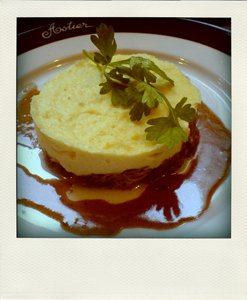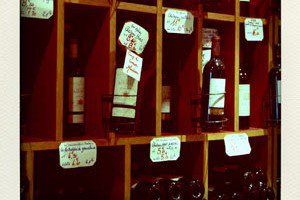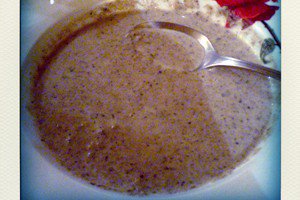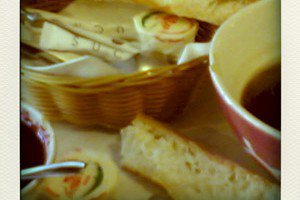
This is part of a series on French idiomatic expressions that relate to food. Read the introductory Edible Idiom post, and browse the list of French idioms featured so far.
This week’s expression is, “Ne pas savoir à quelle sauce on va être mangé.”
Literally translated as, “not knowing what sauce one is going to be eaten with,” it means that one’s prospects are uncertain, not very good, and entirely outside of one’s control. (Any resemblance to global events is purely coincidental.)
Example #1: “L’usine vient d’être rachetée par un groupe étranger et les ouvriers ne savent pas à quelle sauce ils vont être mangés.” “The factory was just bought out by a foreign corporation and the workers don’t know what sauce they’re going to be eaten with.”
I find this an extraordinarily eloquent idiom — I picture a soup plate in which tiny humans wriggle as a giant ogre tries to decide between ketchup and béchamel –, so vividly it conveys the idea that the subject’s fate is submitted to the decisions, or interests, of a much more powerful force: he’s beyond wondering whether or not he’s going to be eaten, that’s already settled, now it’s only a matter of finding out how exactly.
It is often used to illustrate situations that oppose employees and employers, or citizens and government, but it can also be used more lightly:
Example #2: “C’était la première fois que j’allais chez l’acupuncteur, alors je ne savais pas à quelle sauce j’allais être mangé.” “It was my first visit with an acupuncturist, so I didn’t know what sauce I was going to be eaten with.”
Listen to the idiom and examples read aloud:
Note that the core of the idiom is “à quelle sauce être mangé”. It can appear in slight variations, such as “A quelle sauce nos enfants vont-ils être mangés ?” (What sauce will our children be eaten with?), or “Je me demande à quelle sauce je vais être mangé” (I wonder what sauce I’m going to be eaten with).













